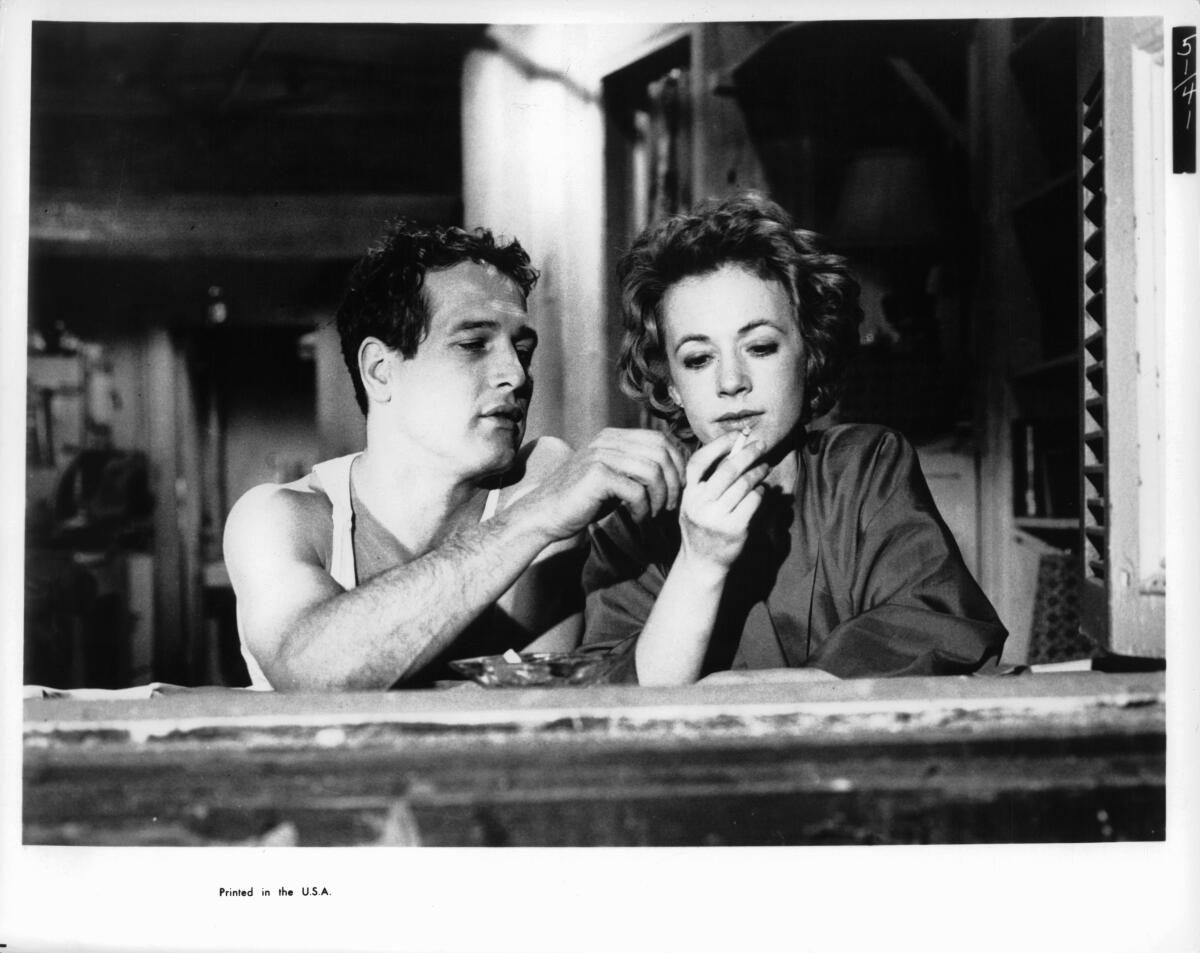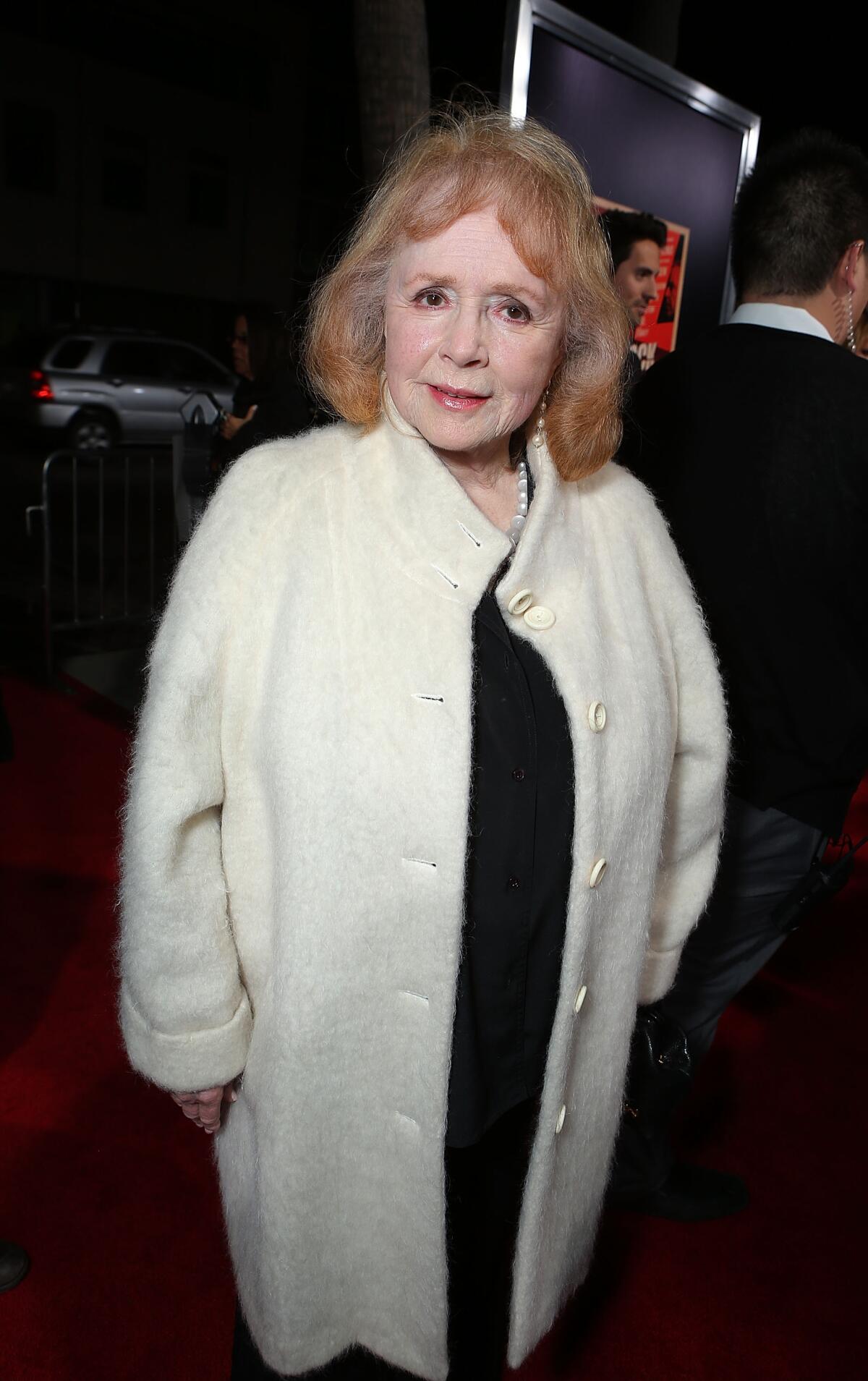Piper Laurie, Oscar-nominated actor who starred in ‘Carrie’ and ‘The Hustler,’ is dead at 91

- Share via
Piper Laurie, the Oscar- and Emmy-nominated actor who earned distinction in films such as “Carrie” and “Children of a Lesser God” and cult status in the quirky mystery drama series “Twin Peaks,” has died.
Laurie’s career spanned six decades, taking her from perky starlet roles during Hollywood’s golden era to a three-time Academy Award nominee who — despite the honors and accolades — repeatedly criticized what she saw as Hollywood’s superficiality.
Still acting until late in life, Laurie died Saturday morning in Los Angeles, her manager, Marion Rosenberg, confirmed. She was 91. An exact cause of death was not given.
“Ms. Laurie was one of the great talents of her generation, a true polymath and a very special human being,” Rosenberg said.
Born Rosetta Jacobs in Detroit on Jan. 22, 1932, she was painfully shy as a child but nevertheless knew she wanted to act. At 15, she lied her way into an acting class in Hollywood, then landed her first role at age 17 when someone from Universal spotted her. Thus began her early career as a token bombshell in one low-end picture after another.
In her first big role, 1950’s “Louisa,” she played the daughter of Ronald Reagan, whom — in real life —she later dated. (He was more than 20 years her senior.) Her character, Cathy Norton, was “ a caricature of a teenager,” she said.
Similar unremarkable roles kept coming her way — “Francis Goes to the Races,” “Son of Ali Baba” with Tony Curtis and “Ain’t Misbehavin’” with Rory Calhoun, among them. But she grew dissatisfied with the factory films the studio was churning out. As glamorous as the studio PR bosses tried to make her seem — posing her in swimsuits for publicity photos, telling the media her flawless skin was a result of eating flower petals and bathing in milk — she balked at being cast as a sex symbol.
“At the time I felt demeaned,” she said in a 1991 interview with United Press International. “But I was young, naive and frightened. I knew someday I would be a serious actress, but I didn’t know how. I was too shy to assert myself.”
She told the New York Times that she was told by the studio never to go outside without makeup, out of fear she wouldn’t look like a movie star. She also said the studio had simply given her a new name without consulting her.
At 23 she rebelled, breaking off her engagement to a man she said she realized she didn’t really want to marry and asking the studio to let her out of her contract,

“I was rebelling against everything I knew,” she told The Times in 2010. “My agent sent me a script, and it was a western and the part was stupid and I said, ‘I can’t do it.’ I walked to the fireplace and dropped it in. I called my agent at home and said, ‘They can’t jail me. I don’t care what they do. I am not going to do this.’”
A week later, Universal let her out of her contract.
It proved more difficult to free herself from her sex-symbol status and the critics who berated her for turning her back on Hollywood. So she turned to theater and live television at a time when variety shows were coming into their own.
She set out for New York and got her break with a small part on “Robert Montgomery Presents” in 1955. She went on to appear in “The Glass Menagerie” on Broadway, the original “Days of Wine and Roses” with Cliff Robertson on “Playhouse 90” and “General Electric Theater.”
In 1961, she was cast as Paul Newman’s fragile girlfriend in “The Hustler,” which resulted in Oscar nominations for both. Though the film was heralded, Laurie said she found herself quickly typecast again.
“I got offers to play more girls like I played in ‘The Hustler,’ crippled and emotionally crippled girls,” she told the New York Times. “I started to turn things down, and after a while I realized nobody was offering me anything.”
So she turned her back on Hollywood again.
She married journalist Joe Morgenstern, moved to upstate New York and became a full-time homemaker and mother. She became politically active, campaigning for George McGovern’s presidency among other causes, and pursued her passion for sculpting, a hobby she continued until late in life.
“I became a mother. I sculpted. I baked a lot of bread. The Vietnam War started, and I just lost my interest in acting. I didn’t have my heart in it,” she told The Times. “It seemed so irrelevant.”
When director Brian De Palma called her about taking the role of the neurotic mother in his film “Carrie,” Laurie agreed to end her 15-year hiatus.
“I didn’t feel the life-or-death pressure I had put on myself,” she told The Times. “That’s not bad for a young actress to have, but being a mother and having some perspective about the world changes you and your values.”
Laurie earned an Oscar nomination for her performance in “Carrie” and then another for 1986’s “Children of a Lesser God.”

In 1981 she was cast as Magda Goebbels, the wife of Nazi Germany’s propaganda minister Joseph Goebbels, in “The Bunker,” a made-for-television war movie that starred Anthony Hopkins as Hitler. She said, being a woman of Jewish descent, the role was difficult.
“I had a knot in my stomach the whole time I was reading [the script],” she told Pop Matter in 2012. “I had, even as a child, a violent response to Hitler as, I suppose you can call him a ‘human being,’ though I really don’t think he deserved that title. He was alive at one point, he was a person, but I just had nightmares about him when I was a little girl. It was kind of treacherous getting into this material and trying to empathize with such people.”
In 1986, she won an Emmy for supporting actress for her role in the miniseries “Promise” opposite James Garner and James Woods.
Her performance as Catherine Martell, the impervious lumber mill owner in director David Lynch’s “Twin Peaks,” also earned her a Golden Globe Award in 1991 and two Emmy nominations. When Martell disappeared from the series’ storyline, Laurie’s cast mates assumed the actress had been dropped from the series. But she later reemerged in the edgy show, unrecognizably, as the mustachioed Japanese businessman Fumio Yamaguchi.
“It was horrible. I couldn’t tell my friends or family what I was doing. David insisted it be kept a tight secret,” she told United Press International. “When Yamaguchi’s identity was finally revealed, everybody on the show, except for the six or seven in on the plot, was totally astounded.”
She was nominated for eight Emmys in all for her work on “Twin Peaks,” “St. Elsewhere” and “Frasier,” among others. She also made a guest appearance on “Will & Grace” and played George Clooney’s mother on “ER.”
She said the awards and nomination over the years were appreciated but ultimately meant little.
“I really didn’t care,” Laurie said in a 2015 interview with the Archive of American Television. “I just didn’t believe in awarding performances or judging performances, this job is better than that.”
In her candid 2011 memoir, “Learning to Live Out Loud,” which she wrote herself, the actress outlined her transformation from a withdrawn child into an outspoken woman. She revealed that her parents put her and her sister in a children’s asylum and that she lost her virginity to Reagan, and provided insight about a young Mel Gibson, who played her young lover in 1979’s “Tim.”
Later in life, she wrote and directed the short film “Property” and directed Jim Brochu’s one-man drama “Zero Hour” in 2011.
Asked if there was anything she missed about her early studio days, Laurie paused only briefly.
“There was a great salad in the commissary,” she said. “That’s the only thing I miss.”
Laurie is survived by her daughter, Anna Grace Morgenstern.
Former Times staff writer Steve Marble and staff writer Stacy Perman contributed to this story.
More to Read
Start your day right
Sign up for Essential California for the L.A. Times biggest news, features and recommendations in your inbox six days a week.
You may occasionally receive promotional content from the Los Angeles Times.








